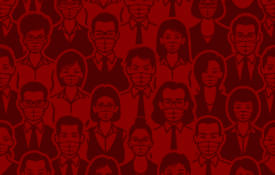-

Trump’s Tweets: Telling Truth From Fiction From the Words He Used
Sometimes the words we choose say more than we intend. New research on a fact-checked collection of tweets from former president Donald Trump uncovered telltale word choices when he was being deliberately misleading. [Video Included]
-

APS Urges Psychological Science Expertise in New U.S. Pandemic Task Force
APS has responded to urge that psychological science expertise be included in the group’s personnel and activities.
-
Thinking About Quitting Your Job? Ask These Six Questions First.
The Labor Department reported on Jan. 4 that 4.53 million people quit their jobs in November, breaking a record set in September and part of an almost year-long trend that has been dubbed the “Great Resignation.” You might be tempted to join them: In July, Gallup found that 48 percent of U.S. workers were actively job-hunting or keeping an eye out for opportunities, a situation the polling organization labeled the “Great Discontent.” As a psychologist, I’ve seen that discontent reflected in my practice. Many of my patients have been doing much more soul-searching about their jobs than before the coronavirus blew up our lives.
-
The Year of Practical Thinking
A new year, with its blank calendar pages, usually engenders widespread optimism, a feeling that this time around, things will be different. But this January comes with heavy baggage. After nearly two years of uncertainty, struggle, and loss due to the coronavirus pandemic, the future has many of us feeling more apprehensive than excited. Humans tend to view big temporal changes as moments of renewal and potential, according to Katy Milkman, a behavioral economist at the University of Pennsylvania. “We group life into chapters,” she told me, underscoring the idea that people commonly see themselves as characters in their own book.
-
Neuroscience Says There’s No Such Thing as Free Will. A Psychologist Explains Why That Might Not Be True
The question of free will is still hotly debated. On the one hand, we clearly experience ourselves as able to make choices and freely act on them. If you fancy some crisps, you can choose to walk into a shop, buy a packet and eat them. Or you can choose to eat a pastry, a salad, or nothing at all. This certainly feels like free will. On the other hand, neuroscience evidence clearly shows that the brain usually initiates our actions before we’re aware of them. Here’s what I mean. Your brain’s primary task is to regulate the systems of your body to keep you alive and well.
-
Sweden Sets Up Psychological Defense Agency to Fight Fake News, Foreign Interference
Sweden is launching a new agency to defend against a rising threat: disinformation — organized campaigns to spread false information. The Scandinavian country, home to about 10 million people, established the Swedish Psychological Defense Agency on Jan. 1, in a bid to safeguard its “democratic society” and “the free formation of opinion,” the agency said on its website. As the country heads into elections this year, the agency will work alongside the Swedish military and government on the new battleground of fake news and misinformation.

